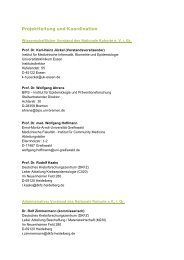Scientific Concept of the National Cohort (status ... - Nationale Kohorte
Scientific Concept of the National Cohort (status ... - Nationale Kohorte
Scientific Concept of the National Cohort (status ... - Nationale Kohorte
Create successful ePaper yourself
Turn your PDF publications into a flip-book with our unique Google optimized e-Paper software.
A.7<br />
A.7 Ethical aspects<br />
pants, travel accident insurance may be required. A special insurance will cover participants<br />
who receive a DXA or MRI examination.<br />
A.7.2 Procedures for ethical clearance <strong>of</strong> <strong>National</strong> <strong>Cohort</strong> proposals<br />
A.7.2.1 regulatory framework<br />
The <strong>National</strong> <strong>Cohort</strong> will be conducted in accordance with all relevant legislation, including<br />
<strong>the</strong> Federal Data Protection Act, <strong>the</strong> Data Protection Acts <strong>of</strong> <strong>the</strong> German States (which are<br />
comparable to <strong>the</strong> Federal Data Protection Act), <strong>the</strong> German Constitution, <strong>the</strong> registration<br />
laws <strong>of</strong> <strong>the</strong> Federal States, and <strong>the</strong> Cancer Registries Law. Overall, according to §1 <strong>of</strong> <strong>the</strong><br />
German Constitution, human dignity will be protected. The right <strong>of</strong> self-determination, and<br />
<strong>the</strong> right to life and physical integrity are regulated in §2, German Constitution. Since, for<br />
example, <strong>the</strong> collection <strong>of</strong> blood samples may affect physical integrity, participants must<br />
give <strong>the</strong>ir written consent to <strong>the</strong> study.<br />
In <strong>the</strong> following, <strong>the</strong> term “personal data” includes names, addresses, and o<strong>the</strong>r contact<br />
data as well as all medical study data that are collected during <strong>the</strong> study. In order to better<br />
protect <strong>the</strong> privacy <strong>of</strong> study participants, personal data will be split up into <strong>the</strong> two parts<br />
“personal identifying data” (name, contact data) and “study data” (only medical data).<br />
For recruitment, <strong>the</strong> responsible registry <strong>of</strong>fice will provide <strong>the</strong> study centers with randomly<br />
selected registration data. According to <strong>the</strong> respective registry law <strong>of</strong> <strong>the</strong> Federal States 1 ,<br />
personal data can be transferred from <strong>the</strong> registry <strong>of</strong>fice to an <strong>of</strong>ficial <strong>of</strong>fice (university, research<br />
institute) if <strong>the</strong>se institutions need <strong>the</strong>se data to fulfill <strong>the</strong>ir functions. According to<br />
§14, Federal Data Protection Act, <strong>the</strong> mentioned institutions are allowed to store, alter, and<br />
use personal data if this is necessary to fulfill <strong>the</strong>ir functions.<br />
Personal data must be deleted once no longer needed to fulfill <strong>the</strong> specific functions (§20,<br />
Federal Data Protection Act). Within <strong>the</strong> scope <strong>of</strong> <strong>the</strong> <strong>National</strong> <strong>Cohort</strong>, study data will be<br />
kept for <strong>the</strong> long-term, because it is anticipated to be <strong>of</strong> scientific value for a long time. Personal<br />
identifying data will be deleted after <strong>the</strong> end <strong>of</strong> <strong>the</strong> study, after withdrawal and when<br />
no fur<strong>the</strong>r direct contact to <strong>the</strong> participants or reidentification <strong>of</strong> individuals is needed. During<br />
<strong>the</strong> follow-up period, direct contact to <strong>the</strong> participants will be necessary, e.g., to update<br />
information on health <strong>status</strong> and relevant exposures. Due to <strong>the</strong> study design, it is planned<br />
to use personal identifying data for at least 20–30 years.<br />
According to §3a, Federal Data Protection Act, personal data must be anonymized or coded<br />
(pseudonymized). Personal identifying data will be stored strictly separated from study data<br />
with additional restrictions for access. Only few staff members will have access to personal<br />
identifying data. All <strong>National</strong> <strong>Cohort</strong> staff members with direct contact to participants or personal<br />
identifying data will be committed to follow data secrecy according to §5, Data Protection<br />
Act and will be made aware <strong>of</strong> §203 Criminal Code in <strong>the</strong> case <strong>of</strong> breach <strong>of</strong> duty. Within<br />
<strong>the</strong> scope <strong>of</strong> <strong>the</strong> <strong>National</strong> <strong>Cohort</strong>, exclusively coded scientific study data will be transferred<br />
from <strong>the</strong> study centers to <strong>the</strong> integration centers for centralized recording.<br />
The access to and use <strong>of</strong> secondary data will be conducted in accordance with §287, Social<br />
Security Code V, and §75, Social Security Code X.<br />
According to §1, Cancer Registries Law, cancer registries must provide coded data for<br />
scientific research. According to §8, Cancer Registries Law, in which measures concerning<br />
1 § 24 Schleswig-Holstein; § 25 Berlin; Art. 28 Bavaria; § 28 Brandenburg; § 29 Baden-Wuerttemberg, Lower<br />
Saxony, Saxony, Saxony-Anhalt; § 30 Bremen; § 31 Hamburg, Mecklenburg-Western Pomerania, Rhineland-<br />
Palatinate, North Rhine-Westphalia, Saarland<br />
196



